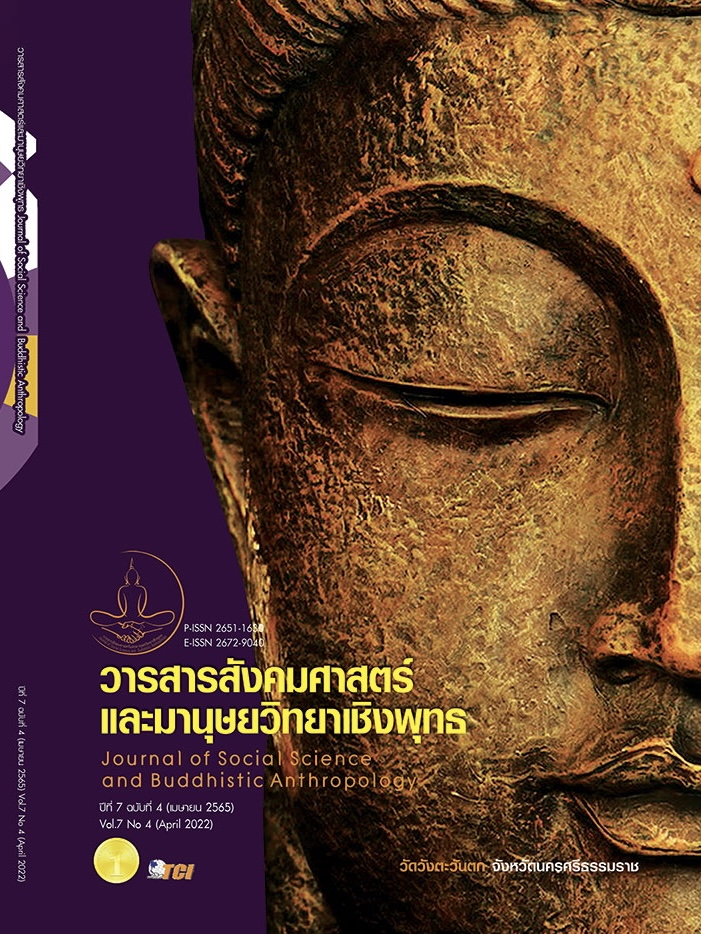TEACHING STRATEGIES FOR ENGLISH LISTENING COMPREHENSION FOR UNDERGRADUATE STUDENTS
Keywords:
Listening Strategies, English Listening Comprehension, Undergraduate StudentsAbstract
The objectives of this research article were to 1) study the English listening comprehension learning strategies of undergraduate students, 2) examine the effect of teaching strategies on English listening comprehension, 3) explore the undergraduate students ’satisfaction regarding teaching strategies for English listening comprehension. A mixed-methods research design was used for both qualitative and quantitative data collection. A sample of 60 students in 2 groups of 7 groups of the first-year students who enrolled in an English for Life Skills course in the second semester of year 2020 at Rajamangala University of Technology Lanna Chiangrai. The research instruments used for data collection were the English listening comprehension interview form, the English listening comprehension tests (pre-test and post-test), and the survey form measuring undergraduate students’ satisfaction toward the English listening comprehension teaching strategies used. The quantitative data analysis encompassed percentage, mean, standard deviation, t-test, and content analysis of interview data. The results of the study revealed that there were 4 strategies used by the undergraduate students including watching through digital media, listening through social media, using applications, and using their existing experience. The strategy used by all of the students was their existing experience. After English listening comprehension teaching strategies had been applied, it was found that the students’ post-test scores were higher than their pre-test’s with a statistical significance at the 0.05 level and their satisfaction toward the teaching strategies was also found at the highest level.
References
กรองแก้ว ศิลปศาสตร์. (2554). กรณีศึกษาผลการใช้เทคนิคก่อนฟัง ขณะฟัง และหลังฟังต่อความเข้าใจอาชญากรรมของนักเรียนระดับชั้น มัธยมศึกษาตอนปลาย โรงเรียนศรีธรรมราชศึกษา จังหวัดนครศรีธรรมราช. ใน วิทยานิพนธ์ศิลปศาสตรมหาบัณฑิต สาขาวิชาการสอนภาษาอังกฤษเป็นภาษานานาชาติ. มหาวิทยาลัยสงขลานครินทร์.
ทนงศักดิ์ กุตระแสง. (2560). การศึกษากลวิธีการเรียนรู้คำศัพท์ภาษาอังกฤษของนักเรียนจ่าทหารเรือ สังกัดกองทัพเรือ. ใน วิทยานิพนธ์ครุศาสตรมหาบัณฑิต สาขาวิชาการสอนภาษาอังกฤษ. มหาวิทยาลัยราชภัฏราชนครินทร์.
ทิฐิรัฐ รุ้งแก้ว. (2562). การฝึกทักษะการฟังภาษาอังกฤษด้วยตนเองผ่าน Google Apps. วารสารวิชาการศิลปศาสตร์ประยุกต์ (The Journal Of Faculty Of Applied Arts), 12(2), 49-58.
ปราถนา ผดุงพจน์. (2561). การใช้กิจกรรมเพลงภาษาอังกฤษเพื่อส่งเสริมการออกเสียงต่อเนื่องกันในภาษาอังกฤษนักศึกษาสาขาวิชาภาษาอังกฤษ มหาวิทยาลัยราชภัฏพระนคร. วารสารศึกษาศาสตร์ มหาวิทยาลัยขอนแก่น, 42(1), 79-89.
ปรียานุช ทองเกลี้ยง. (2562). ผลการใช้แบบฝึกประกอบภาพยนตร์ที่มีต่อทักษะการฟัง ภาษาอังกฤษของนักเรียนระดับชั้นมัธยมศึกษาปีที่ 3. ใน วิทยานิพนธ์ศึกษาศาสตรมหาบัณฑิต สาขาการสอนภาษาอังกฤษ. มหาวิทยาลัยศิลปากร.
ปวีณนุช พุ่มจิต และ คณะ. (2561). การใช้แอพลิเคชั่นในการพัฒนาทักษะภาษาอังกฤษด้านการฟัง. วารสารมหาวิทยาลัยราชภัฎสวนสุนันทา, 1(1), 550-556.
พรพิหค พูนใจสม และ คณะ. (2562). การใช้กิจกรรมการเล่านิทานเพื่อพัฒนาความสามารถด้านการฟังภาษาอังกฤษ ของนักเรียนระดับชั้นประถมศึกษาปีที่ 6. วารสารสังคมศาสตร์วิจัย, 10(1), 147-165.
มงคล โสดาจันทร์. (2561). การใช้กลยุทธ์ในการฟังเพื่อสร้างเสริมทักษะการฟังภาษาอังกฤษของนักศึกษาชั้นปีที่ 1: กรณีศึกษามหาวิทยาลัยรังสิต. วารสารนวัตกรรมและเทคโนโลยีการเรียนรู้ วิทยาลัยเทคโนโลยีสยาม, 1(2), 53-64.
รุ่งพนอ รักอยู่ และ คณะ. (2560). ความสามารถด้านการฟังภาษาอังกฤษเพื่อความเข้าใจของนักศึกษาไทยที่เรียนภาษาอังกฤษเป็นภาษาต่างประเทศในสถาบันการพลศึกษาในเขตภาคกลาง. NRRU Community Research Journal วารสารชุมชนวิจัย, 11(3), 81-94.
วิลดา ศรีทองกุล. (2562). การพัฒนาทักษะการฟัง-พูดในวิชาภาษาอังกฤษเพื่อการสื่อสารของนักศึกษามหาวิทยาลัยราชภัฏธนบุรี สมุทรปราการ โดยใช้แอพลิเคชั่น Echo English. วารสารวิชาการ มนุษยศาสตร์และสังคมศาสตร์มหาวิทยาลัยราชภัฏธนบุรี, 2(3), 23-42.
ศราธรณ์ หมั่นปรุ และคณะ. (2562). กลวิธีการสอนอย่างมีประสิทธิภาพเพื่อส่งเสริมการฟัง พูดภาษาอังกฤษ ของผู้เรียนภาษาอังกฤษเป็นภาษาต่างประเทศ ในศตวรรษที่ 21. วารสารวิชาการเครือข่ายบัณฑิตศึกษามหาวิทยาลัยราชภัฏภาคเหนือ, 9(2), 1-16.
สมพร โกมารทัต. (2559). การศึกษาการใช้กลยุทธ์การเรียนภาษาต่างประเทศของนักศึกษาระดับปริญญาตรีใน กรุงเทพฯและปริมณฑล. ใน รายงานการวิจัย. มหาวิทยาลัยธุรกิจบัณฑิตย์.
สุจินต์ หนูแก้ว และ คณะ. (2556). การนำเสนอยุทธศาสตร์การเรียนการสอนการฟังภาษาอังกฤษเพื่อความเข้าใจของนักศึกษาครู. ใน วราสารศึกษาศาสตร์ มหาวิทยาลัยนเรศวร. 15(3), 78-84.
โสภิต สุวรรณเวลา. (2562). ผลการพัฒนาทักษะการฟังและการอ่านภาษาอังกฤษโดยการชมภาพยนตร์และฟังเพลง ของนักศึกษาพยาบาล ชั้นปีที่3 วิทยาลัยพยาบาลบรมราชชนนีตรัง. วารสารมนุษยศาสตร์และสังคมศาสตร์นายเรืออากาศ, 8(1), 116-127.
อรุณี อรุณเรือง และคณะ. (2560). รูปแบบการเรียนภาษาอังกฤษของนักศึกษาคณะศิลปศาสตร์ มหาวิทยาลัยเทคโนโลยีราชมงคลพระนคร. เรียกใช้เมื่อ 20 เมษายน 2564 จาก https://repository.rmutp.ac.th/bitstream/handle/123456789/2588/ LARTS_61_17.pdf
อุมาพร ใยถาวร. (2559). การเปรียบเทียบการพัฒนาทักษะการฟังภาษาอังกฤษของนักศึกษาโดยใช้เพลงภาษาอังกฤษกับการสอนแบบปกติ. เรียกใช้เมื่อ 5 มีนาคม 2564 จาก http://journal.pim.ac.th /uploads/content/2014/09/o_191huof0h1437tdq 188tvph1tbsa.pdf
Al-Nafisah, K. I. (2019). Issues and Strategies in Improving Listening Comprehension in a Classroom. International Journal of Linguistics, 11(3), 93-106.
Buck, G. (2001). Assessing Listening. Cambridge England: Cambridge University Press.
Doff, A. (2001). Teaching English: A training course for teachers. (14th Ed.). Cambridge England: Cambridge University Press.
Goh, C. (2002). Teaching listening in the language classroom. Singapore: SEAMEP Regional Language Center.
Hedge, T. (2000). Teaching and learning in the language classroom. New York: Oxford University Press.
Jones, D. (2008). Is there any room for listening? The necessity of teaching listening skills in ESL/EFL classrooms. Retrieved March 2, 2021, from https://www.kansai-u.ac.jp/fl/ publication/pdf_forum/7/02_jones_15.pd
Likert, R. (1967). The Method of Constructing and Attitude Scale. In Reading in Fishbeic, M (Ed.), Attitude Theory and Measurement. New York: Wiley & Son.
Nation, I. S. P. & Newton, J. (2009). Teaching ESL/EFL listening and speaking. New York: Routledge.
Oxford, R. L. (1990). Language learning strategies: What every teacher should know. New York: Newbury House/Harper & Row.
Piamsai, C. (2014). An Investigation of the Use of Listening Strategies and Listening Performance of Proficient and Non Proficient language Learner. PASSA: Journal of Lannguage
Teaching and Learning in Thailand, 47(1), 147-181.
Rokni, S. & Ataee, A. (2014). The Effect of Movie Subtitles on EFL Learners’ Oral Performance. International Journal of English Language, Literature and Humanities, 1(5), 201-215.
Sari, N. P. et. al. (2019). Improving Listening Skill Using Learn English By Listening Application. PROJECT (Professional Journal of English Education), 2(4), 455-460.
Downloads
Published
How to Cite
Issue
Section
License
Copyright (c) 2022 Journal of Social Science and Buddhistic Anthropology

This work is licensed under a Creative Commons Attribution-NonCommercial-NoDerivatives 4.0 International License.









